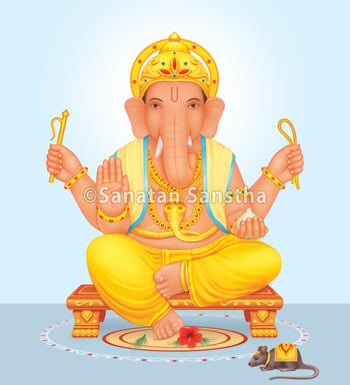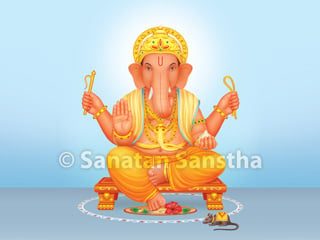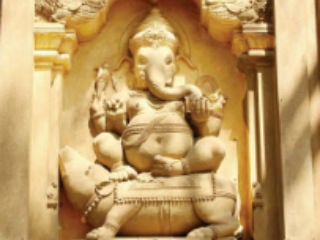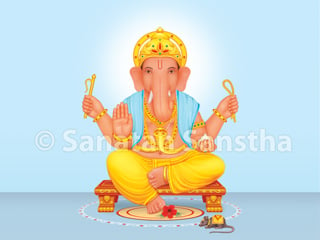Contents
1. Performing ritualistic worship of Shri Ganesh in the beginning of religious ritual
2. Why is the worship of Shri Ganesh spiritually beneficial to all?
3. Righteous actions to be done during the period of Shri Ganesh festival
5. Benefits of worshipping Shri Ganesh on Shri Ganesh Chaturthi
6. Shri Ganesh Chaturthi and shauchashaucha
7. Important worship of Shri Ganesh as per the Time

1. Performing ritualistic worship of Shri Ganesh in the beginning of religious ritual
It is customary to begin every religious ritual with ritualistic worship of Shri Ganesh. In this ritual a small mound of unbroken rice is kept instead of the idol of Shri Ganesh and betel nut is kept on it. In the regions like the western coast, coconut is kept instead of the betel nut. Shri Ganesh is invoked in the betel nut or the coconut. At that time following mantra is recited:
ॐभूर्भुव:स्व:ऋद्घिबुद्घिसहितंसांगंसपरिवारंसायुधंसशक्तिकंमहागणपतिम्आवाहयामि।
Meaning: O Shri Ganesh, I invoke You to come along with the Deities (Riddhi-Siddhi), Your entire family, all weapons, Energy and with all valour.
With the recitation of this mantra, Shri Ganesh is invoked and His ritualistic worship is done with sixteen substances (Shodashopachar-pūja). Then prayer is offered to Shri Ganesh:
वक्रतुण्डमहाकायसूर्यकोटिसमप्रभ।
निर्विघ्नंकुरुमेदेवसर्वकार्येषुसर्वदा।।
Meaning: O Deity, whosets right people following unrighteous paths, hasa huge body, who is endowed with the radiance of a million suns, may all my tasks be always free of obstacles.
The betel nut in which Shri Ganesh was invoked is immersed after the completion of the ritual.
2. Why is the worship of Shri Ganesh spiritually beneficial to all?
Shri Ganesh is associated with the frequencies of Desire associated with the Absolute Earth (Pruthvi) and Ether (Apa) Elements. That is why ritualistic worship of Shri Ganesh is beneficial both for men and women. It helps in conserving the sattva-guṇa in the body and there is an enhancement in the thoughts about spiritual practice.
3. Righteous actions to be done during the period of Shri Ganesh festival
A) Make a rangoli daily in the courtyard and in front of the Shri Ganesh idol which attracts the Ganesh principle.
B) Do ritualistic worship of the Shri Ganesh idol everyday in the morning and evening.
C) After the ritualistic worship, offer arati to Shri Ganesh
Instead of singing many aratis, sing selective aratis. But sing with the spiritual emotion that Shri Ganesh is actually sitting in front of oneself. As far as possible do not speak to one another while offering arati. Pray together after arati. After praying, chant together for sometime.
1. After the ritualistic worship, offer arati to Shri Ganesh with spiritual emotion along with all the family members.
2. Sing the arati in a melodious and soft voice.
3. Clap and play the cymbals gently for generation of sound (nad).
D) In the evening after offering arati once again, sit with all the family members and chant ‘Om Gan Gaṇapataye Namaha’.
E) During the period of Shri Ganesh festival do maximum spiritual practice and absorb the Chaitanya present in the environment.
As compared to the superior Deities, the Ganesh frequencies remain active on Earth in a greater proportion. That is why the Ganesh frequencies convey the prayers of the Jivas residing on the Earth to the superior Deities. For a person to reach out to the superior Deities spiritual practice and high proportion of spiritual emotion is required.
4. Spiritual experience obtained by doing ritualistic worship
of Shri Ganesh as per the Family tradition
By ritualistically worshipping the Shri Ganesh idol for one and half days as per the observance peculiar to family (Kuladharma) and the Family tradition (Kulachar), having the experience that the idol of Shri Ganesh is in bliss too: As per the guidance of H.H. Dr. Athavale, a Saint of a high spiritual level, I started following the observances peculiar to our family (Kuladharma) and the family tradition (Kulachar). In our family, the idols of Shri Ganesh and Gouri are immersed together on the seventh day. In 2006 we worshipped the Shri Ganesh idol only for one and a half days. At that time I experienced that the idol of Shri Ganesh is in bliss too. – Mrs. Sandhya Dongre, Maharashtra
During the period of Ganesh festival, the Ganesh principle is active in a greater proportion. That is the reason why the devotees of Shri Ganesh get various spiritual experiences. The spiritual experience of Sandhya Dongre is an example of this.
5. Benefits of worshipping Shri Ganesh on Shri Ganesh Chaturthi
A) Worshiper’s physical and mental stress reduces.
B) The intellect of the worshiper sharpens
C) The intellect of the worshiper becomes steady and the subconscious mind calm.
D) The raja-tama in the worshiper is destroyed.
E) The vital energy of the worshiper increases.
F) The Adnya-chakra of the worshiper is activated.
G) The subtle body of the worshiper is purified.
H) The worshiper can get spiritual experience of Divine touch.
So the ritualistic worship of Shri Ganesh, chanting His Name etc. should be done with spiritual emotion on Shri Ganesh Chaturthi. Vrat of Shri Ganesh Chaturthi is also advised during the period of Shri Ganesh festival.
6. Shri Ganesh Chaturthi and shauchashaucha
If a woman among the family delivers a baby and there is ashaucha associated with a birth or the ashaucha associated with someone’s death during the period of Shri Ganesh Chaturthi, the religious rites like ritualistic worship etc. should be done through a vrat-representative. The vrat-representative could be any one – sister, disciple, priest or a companion. By doing this, the vrat will not break.
7. Important worship of Shri Ganesh as per the Time
Various religious actions to be performed during Shri Ganesh festival and the benefits available from them :
Action |
Benefit
|
| 1. Ritualistic worship of Shri Ganesh | 20 |
| 2. Observing conduct for imbibing the Ganesh Principle |
20 |
| 3. Chanting the Name of Shri Ganesh | 30 |
| 4. Preventing the denigration of the image of Shri Ganesh |
30 |
| Total | 100 |
Here a question can arise in our mind, who will denigrate Shri Ganesh during the period of Shri Ganesh festival? However, it is a matter of regret that such incidents are taking place regularly.
The Deities are disrespected in various ways. They are insulted through the mediums of lectures, books, plays etc. The Deities are used as a model for the advertisements of commercial products. All these denigrating incidents happen in respect to Shri Ganesh in higher proportion. For example :
A) In one instance, Ganesh has been created using various parts of a computer.
B) In a Marathi play ‘Ganapati Bappa Moraya’, many jokes have been cracked on Ganesh.
C) In a fashion show, there is a picture of Ganesh on the dress of a model.
An example of a weird kind of denigration of Shri Ganesh: In one state, an idol of Shri Ganesh is placed in front of the house of those who do not worship Him on Shri Ganesh Chaturthi day. This is inappropriate as one who does not have any reverence for the Deity will not worship the Deity and it will remain unattended.
Due to ignorance about religious scriptures, during Shri Ganesh festival the idols of Shri Ganesh are made mostly in weird forms, shapes and using raja-tama objects. In such circumstances, preventing the denigrations becomes an important worship as per the Time.
Faith is the very foundation of the worship of Deities. The denigration of Deities affects faith. Hence denigrating the Deities in this manner is harm to Dharma. Prevention of the harm to Dharma is itself abiding by Righteousness, that is, Dharmapalan as per the Time. Hence, Ganesh devotees should be alert to the disrespect of Shri Ganesh, should educate the society on this and try to prevent the harm to Dharma.
For more information on this article, read Sanatan Sanstha’s publication – ‘Holy festivals, Religious festivals and Vowed religious observances’

 Maghi Shri Ganesh Jayanti 2025
Maghi Shri Ganesh Jayanti 2025 Sankashtnashan Stotra
Sankashtnashan Stotra Signs of ancient Hindu culture left behind in foreign lands
Signs of ancient Hindu culture left behind in foreign lands Some mantras to be recited when worshipping Shri Ganesh with specific objectives
Some mantras to be recited when worshipping Shri Ganesh with specific objectives Chants of Shri Ganesh
Chants of Shri Ganesh